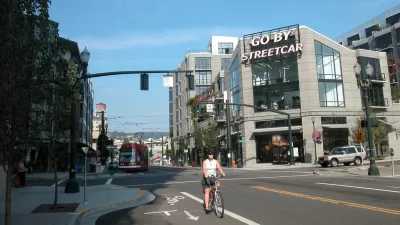Portland's over-educated, under-employed population is largely a semi-retired community of young adults, according to some. But with rising housing prices and overall cost of living, it is unclear how Portland will retain these characteristics.
As Claire Cain Miller writes for a recent piece in the New York Times Magazine, Portland's future as an urban utopia for kombucha brewers, kale growers, and households living off barista tips is hazy. The city has a high amount of educated residents, and unlike corporate nearby cities like San Francisco or Seattle, Portland offers few high-level employment opportunities for them, leading many young people to enter semi-retirement.
According to a July report by the Oregon Employment Department, the state is concerned with low personal income levels, coupled with its employment-to-population ratio. As Miller highlights, "the average income of Oregonians in recent years 'may have been a 'victim' of the state’s attractiveness, and a resulting population influx' by new residents who don’t earn much, the report said."
Indeed, Aaron Renn, urban-affairs analyst who writes for the Urbanophile blog, shared that "personal income per capita in [Portland] grew by a mere 31 percent between 2000 and 2012, slower than 42 other cities, including Grand Rapids, Mich., and Rochester." Despite these low metrics, the population of Portland keeps growing, with new residents attracted to its quality of life. Indeed, "David Albouy, an economics professor at the University of Illinois, has created a metric, the sacrifice measure, which essentially charts how poor a person is willing to be in order to live in a particular city. Portland, he discovered, is near the top of the list." People are moving to Portland not to kickstart their careers, but rather to enjoy the city's unique nature.
With concerns over rising housing prices, many of Portland's semi-retired youth may soon be priced out and forced to move to cheaper pastures.
FULL STORY: Will Portland Always Be a Retirement Community for the Young?

Alabama: Trump Terminates Settlements for Black Communities Harmed By Raw Sewage
Trump deemed the landmark civil rights agreement “illegal DEI and environmental justice policy.”

Planetizen Federal Action Tracker
A weekly monitor of how Trump’s orders and actions are impacting planners and planning in America.

Why Should We Subsidize Public Transportation?
Many public transit agencies face financial stress due to rising costs, declining fare revenue, and declining subsidies. Transit advocates must provide a strong business case for increasing public transit funding.

Understanding Road Diets
An explainer from Momentum highlights the advantages of reducing vehicle lanes in favor of more bike, transit, and pedestrian infrastructure.

New California Law Regulates Warehouse Pollution
A new law tightens building and emissions regulations for large distribution warehouses to mitigate air pollution and traffic in surrounding communities.

Phoenix Announces Opening Date for Light Rail Extension
The South Central extension will connect South Phoenix to downtown and other major hubs starting on June 7.
Urban Design for Planners 1: Software Tools
This six-course series explores essential urban design concepts using open source software and equips planners with the tools they need to participate fully in the urban design process.
Planning for Universal Design
Learn the tools for implementing Universal Design in planning regulations.
Caltrans
Smith Gee Studio
Institute for Housing and Urban Development Studies (IHS)
City of Grandview
Harvard GSD Executive Education
Toledo-Lucas County Plan Commissions
Salt Lake City
NYU Wagner Graduate School of Public Service





























